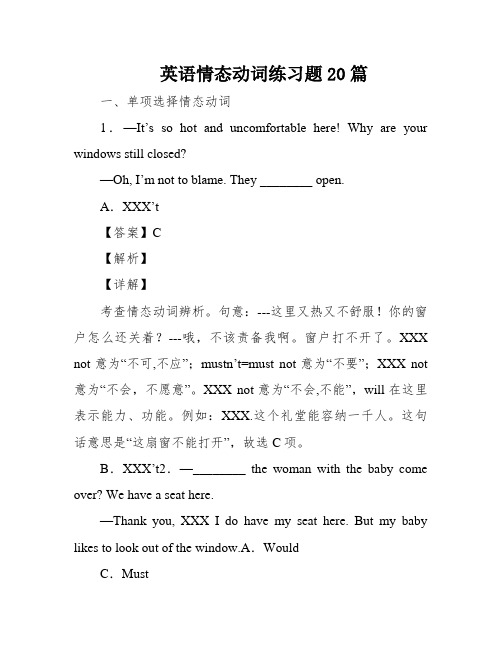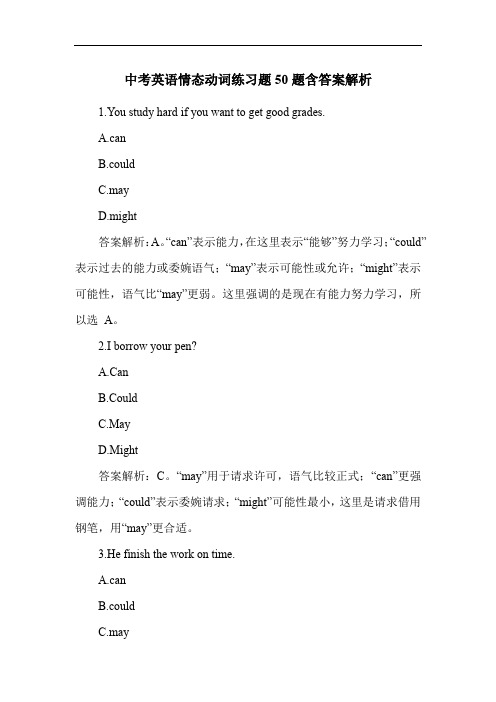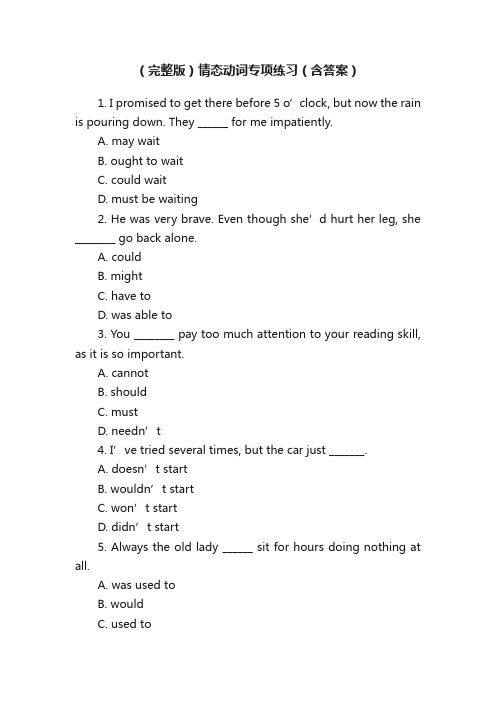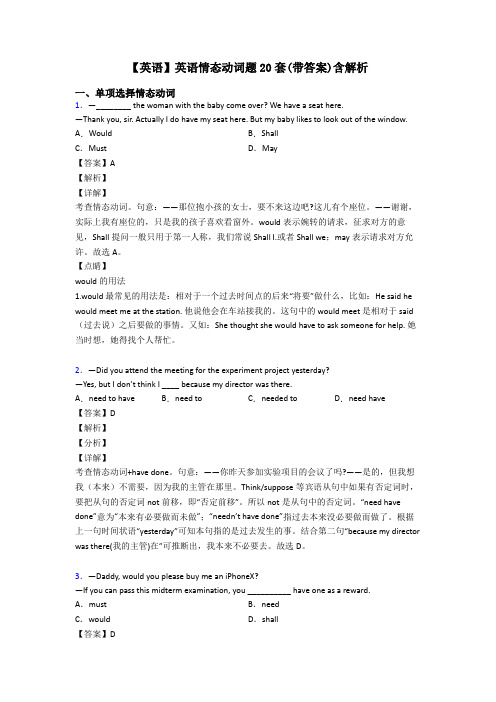英语情态动词练习题20篇
初二英语情态动词练习题20题(答案解析)

初二英语情态动词练习题20题(答案解析)1.We have a test tomorrow. I think I study hard tonight.A.canB.couldC.mayD.might答案解析:A。
can 表示有能力做某事,这里表示“我能够努力学习”,符合语境。
could 是can 的过去式,这里不是过去的情况。
may 和might 表示可能性,这里不是强调可能性。
2.My mother is ill. I stay at home and take care of her.A.canB.couldC.mayD.might答案解析:C。
may 表示许可或者可能性,这里表示“我可以留在家里照顾她”,比较委婉。
can 语气比较强硬。
could 和might 也有可能性的意思,但这里不是最佳选择。
3.I'm not sure if I go to the party. It depends on my homework.A.canB.couldC.mayD.might答案解析:C。
may 和might 都表示可能性,但是may 的可能性比might 大一些。
这里不确定是否能去派对,用may 比较合适。
can 和could 表示能力或者许可,不符合语境。
4.The teacher said we finish our homework on time.A.canB.couldC.mayD.might答案解析:A。
can 表示有能力做某事或者被允许做某事,这里表示“我们能够按时完成作业”,是老师的要求。
could 是can 的过去式,这里不是过去的情况。
may 和might 表示可能性,不符合语境。
5.I lost my key. I think I find it later.A.canB.couldC.mayD.might答案解析:D。
might 表示可能性比较小,这里不确定是否能找到钥匙,用might 比较合适。
初二英语情态动词练习题20题答案解析版

初二英语情态动词练习题20题答案解析版1.She_____speak three languages.A.canB.mustC.shouldD.would答案解析:A。
“can”表示能力,意为“能够”;“must”表示必须;“should”表示应该;“would”表示过去的意愿或委婉语气。
题干中说她会说三种语言,强调的是能力,所以选A。
2._____I use your pen?A.CanB.MayC.MustD.Should答案解析:B。
“Can I...”和“May I...”都可以表示请求许可,但“May I...”更加委婉。
“must”表示必须;“should”表示应该。
这里询问能否用对方的笔,用委婉的“May I”更合适,所以选B。
3.He_____be at home. I just saw him go out.A.can'tB.mustC.shouldD.would答案解析:A。
“can't”表示不可能;“must”表示肯定推测,一定;“should”表示应该;“would”表示过去的意愿或委婉语气。
题干中说刚看到他出去了,所以不可能在家,选A。
4.You_____finish your homework before you watch TV.A.canB.mustC.shouldD.would答案解析:B。
“can”表示能力或许可;“must”表示必须;“should”表示应该;“would”表示过去的意愿或委婉语气。
这里表示看电视之前必须先完成作业,所以选B。
5._____you help me with this problem?A.CanB.MayC.MustD.Should答案解析:A。
“Can you...”表示请求对方帮忙;“May I...”表示请求许可;“must”表示必须;“should”表示应该。
这里是请求对方帮忙,所以选A。
6.She_____come to the party if she has time.A.canB.mustD.would答案解析:A。
英语情态动词练习题20篇

英语情态动词练习题20篇一、单项选择情态动词1.—It’s so hot and uncomfortable here! Why are your windows still closed?—Oh, I’m not to blame. They ________ open.A.XXX’t【答案】C【解析】【详解】考查情态动词辨析。
句意:---这里又热又不舒服!你的窗户怎么还关着?---哦,不该责备我啊。
窗户打不开了。
XXX not意为“不可,不应”;mustn’t=must not意为“不要”;XXX not 意为“不会,不愿意”。
XXX not意为“不会,不能”,will在这里表示能力、功能。
例如:XXX.这个礼堂能容纳一千人。
这句话意思是“这扇窗不能打开”,故选C项。
B.XXX’t2.—________ the woman with the baby come over? We have a seat here.—Thank you, XXX I do have my seat here. But my baby likes to look out of the window.A.WouldC.Must【答案】A【解析】【详解】考查情态动词。
句意:——那位抱小孩的女士,要不来这边吧?这儿有个坐位。
——谢谢,实践上我有坐位的,只是我的孩子喜爱看窗外。
XXX表示婉转的恳求,征求对方的看法,XXX提问一般只用于第一人称,我们常说Shall I.或者XXX;may表示恳求对方允许。
应选A。
【点睛】would的用法1.would最常见的用法是:相对于一个过去时间点的后来“将要”做什么,比如:He said XXX.他说他会在车站接我的。
这句中的would meet是相对于said(过去说)之后要做的事情。
又如:XXX she would have to ask someone for help.她当时想,她得找个人帮忙。
中考英语情态动词练习题50题含答案解析

中考英语情态动词练习题50题含答案解析1.You study hard if you want to get good grades.A.canB.couldC.mayD.might答案解析:A。
“can”表示能力,在这里表示“能够”努力学习;“could”表示过去的能力或委婉语气;“may”表示可能性或允许;“might”表示可能性,语气比“may”更弱。
这里强调的是现在有能力努力学习,所以选A。
2.I borrow your pen?A.CanB.CouldC.MayD.Might答案解析:C。
“may”用于请求许可,语气比较正式;“can”更强调能力;“could”表示委婉请求;“might”可能性最小,这里是请求借用钢笔,用“may”更合适。
3.He finish the work on time.A.canB.couldC.may答案解析:A。
“can”表示能力,这里表示他有能力按时完成工作;“could”过去的能力或委婉语气;“may”表示可能性或允许;“might”可能性最小,这里强调能力,选A。
4. you help me with this problem?A.CanB.CouldC.MayD.Might答案解析:B。
“could”在这里表示委婉地请求帮助;“can”语气比较直接;“may”和“might”主要表示可能性和允许,不太符合语境。
5.She come to the party if she has time.A.canB.couldC.mayD.might答案解析:C。
“may”表示可能性,在这里表示她有可能来参加派对如果有时间;“can”表示能力;“could”过去的能力或委婉语气;“might”可能性比“may”更小。
6.We go to the park if it doesn't rain.A.canB.couldD.might答案解析:A。
“can”表示能够,这里表示如果不下雨我们能够去公园;“could”过去的能力或委婉语气;“may”表示可能性或允许;“might”可能性最小。
(完整版)情态动词专项练习(含答案)

(完整版)情态动词专项练习(含答案)1. I promised to get there before 5 o’clock, but now the rain is pouring down. They ______ for me impatiently.A. may waitB. ought to waitC. could waitD. must be waiting2. He was very brave. Even though she’d hurt her leg, she ________ go back alone.A. couldB. mightC. have toD. was able to3. You ________ pay too much attention to your reading skill, as it is so important.A. cannotB. shouldC. mustD. needn’t4. I’ve tried several times, but the car just _______.A. doesn’t startB. wouldn’t startC. won’t startD. didn’t start5. Always the old lady ______ sit for hours doing nothing at all.A. was used toB. wouldC. used toD. should6. There used to be a small school,___________?A. was thereB. wasn’t itC. usedn’t thereD. usedn’t it7. Our house is on the top of the hill, so in summer the wind _____ be pretty cold.A. mustB. canC. ought toD. need8. Haven’t I told you that you __________ have the ans wer tomorrow morning?A. willB. shallC. shouldD. would9. I’m surprised that he _______ in the match.A. should failB. should have failedC. would have failedD. may have failed10. Better go to see my sick colleague right now, ________I?A. hadn’tB. didn’tC. don’tD. won’t11. Sir, you ______ be hunting deer here, for they are preserved by the government.A. oughtn’t toB. can’tC. won’tD. needn’t12. Sorry I’m late. I ______ have turned off the alarm clock and gone back to sleep again.A. mightB. shouldC. canD. will13. —There were already five people in the car, but they managed to take me as well.— It __________ a comfortable journey.A. can’tB. shouldn’t beC. must have beenD. couldn’t have been14. To be on the safe side, we should fill up the tank now, because we ______ run out of gas on the way.A. canB. wouldC. mightD. should15. ____ three people who travel together, there _____ be at least one who ____ be my teacher.A. Between; can; willB. In; should; couldC. Among; will; mayD. Of; must; can16. —Could you lend me that book you ______ me aboutwhen I telephoned you?—No, I am sorry, I can’t. I gave it to a friend.A. were tellingB. would tellC. had toldD. had been telling17. —We need a person badly to think up such an idea.—_______ the new comer have a try?A. ShallB. MayC. ShouldD. Need18. We ________ so tired. We’ve only been to a party.A. mustn’t have feltB. wouldn’t have feltC. shouldn’t have feltD. couldn’t have felt19. Professor Smith, many students want to see you. __________ they wait here or outside?A. DoB. ShallC. WillD. Would20. —How about paying a visit to Mr. Richardson, our former history teacher?—Good idea. I will e-mail him today so he _____know _________ to expect us.A. shall; whyB. may; whenC. would; whyD. will; how21. —I went to work on foot yesterday, though it _________ cats and dogs.—You __________ by bus. It was likely to get a cold.A. is raining; must have goneB. rained; would goC. was mining; should have goneD. have rained; could have gone22. You ______ pay too much attention to your reading skill, as it is so important.A. cannotB. shouldC. mustD. needn’t23. I told Sally to fix him up with this job, but perhaps I _________ it out for her.A. had to writeB. must have writtenC. should have writtenD. ought to write24. My sister met him at the Grand Theatre yesterday afternoon, so he ________ your lecture.A. couldn’t have attendedB. needn’t have attendedC. mustn’t have attendedD. shouldn’t have attended25. Research findings show we spend about two hours dreaming every night, no matter what we ________ during the day.A. should have doneB. would have doneC. may have doneD. must have done26. —Is there any flight to Tokyo today?— I think there _____, for the weather is too bad.A. mustn’t beB. mightn’t beC. needn’t beD. can’t be27. —I’m told that John had another car accident this morning.— I believe not. He _____ so careless.A. shouldn’t have beenB. wouldn’t have beenC. couldn’t have beenD. mustn’t have be en28. It was playing computer games that cost the boy a lot of time that he __________ doing his lessons.A. might have spentB. ought to have spentC. must have spentD. could have spent29. —I didn’t know you were good friends.—You _______. I have known her since she moved here. You were studying abroad then.A. may haveB. needn’t haveC. couldn’t haveD. must have30. They must have finished the work by the end of last month, __________?A. mustn’t theyB. haven’t theyC. hadn’t theyD. didn’t they31. —I didn’t see her yesterday.— Of course, you _____, because he had gone for a trip.A. can’tB. may not haveC. can’t haveD. mustn’t have32. You ________ phone him if you want to, but you _________. He is sure to phone you.A. may; mustn’tB. have t o; needn’tC. can; doesn’t needD. can; needn’t33. — She must have gone back to the valley.— ______, she _____ have. The entrance to it was nowhere to be found.A. No; mustn’tB. Yes; mightC. Yes; couldD. No; couldn’t34. He _____ full marks, but he was so careless as to make a spelling mistake.A. must have gainedB. can have gainedC. could have gainedD. must gain35. From what you said, she _____ you about it.A. mustn’t have toldB. can’t have toldC. mustn’t tellD. can’t tell36. — You ought to have made an apology to Tom yesterday evening.— Yes, I know I _________.A. ought toB. have toC. should haveD. must have37. —Is there a fog in the evening?—There _______ be. I’ll make a phone call to find it out.A. mustB. wouldC. willD. might38. — _______ he help you with the problem?—Well, though it is very hard, __________ I’ll do what I can to work it out.A. Shall; butB. Can; andC. Must; howeverD. Will; still39. —How is that, Joan?—Yeah, it’s from the boss. She _________ first, whether she likes it.A. shall goB. ought to have goneC. should goD. must have gone40. —Would you like to watch the video, in which you can see foreigners making jiaoji during the Spring Festival?—Sure, it ______ be very interesting.A. shouldB. mayC. canD. will41. —The door was open.—It _________ open. I had locked it myself and the key was in my pocket.A. can not beB. must not beC. can not have beenD. must not have been42. —Where ________ Margaret have put the empty bottles?—She ________ them away. They must be somewhere.A. can; can’t have thrownB. must; needn’tC. must; must have thrownD. cant; must throw43. —Mum, I climbed to get the Teddy Bear from the top of the shelf.—My goodness! You _______ yourself. You ______ do that next time.A. mu st have hurt; mustn’tB. should have hurt; can’tC. may have hurt; mustn’tD. might have hurt; won’t be able to44. —Shall I go and buy more food and drinks for the party?—No, we have prepared a fridge of those. That _______ be quite enough.A. canB. mayC. mightD. ought to45. —Hurry up, Michael! It’s ten to three.—Goodness me! The class_______. I’ll be late again.A. must beginB. may beginC. should have begunD. must have begun46. When he was there, he ____ go to that coffee shop at the street comer after work every day.A. wouldB. shouldC. had betterD. might47. —I hear you have written a novel.—Yes, the book ________ be out in a month or so.A. canB. dareC. shouldD. need48. —How could I thank you enough?—Don’t mention it. Any other man _________ that.A. must doB. could doC. would have doneD. should have done49. —Why aren’t they here yet?—They ________ the bus.A. can have missedB. must be late forC. may have missedD. might be late for50. Mike _______ come to see me I don’t want to go out in case he comes.A. canB. mustC. mayD. will51. The thief ________ in from the kitchen window as the door was closed.A. may climbB. must have climbedC. could have climbedD. should have climbed52. —You didn’t invite Bill?— __________ him too?A. Must I inviteB. Must I have invitedC. Should I inviteD. Should I have invited53. —Why didn’t you attend the lecture yesterday?—I didn’t think that we _______ on Sundays.A. shouldB. ought to haveC. shouldn’t haveD. will have to54. It’s said that there are plenty of hotels in that town. There ______ be any difficulty for you to find somewhere to stay.A. wouldn’tB. mustn’tC. shouldn’tD. needn’t55. —Would you be here to attend the English party this evening?—Yes, we _________.A. shallB. wouldC. willD. must56. On Sundays when I was a child, Father and I _______ get up early and go fishing.A. couldB. wouldC. mightD. should57. —You’d better keep quiet in class.—Sometimes I ________ Yesterday, I was very quiet during my English class.A. wouldB. doC. didD. have58. I lived with my sister this summer and didn’t have to pay rent. So I ______ save most of my salary.A. couldB. wouldC. was able toD. should59. —Look, John’s fallen asleep.— Oh, he _______ too late last night.A. might sit upB. should have sat upC. could sit upD. must have sat up60. —I posted the letter a week ago.—Then they __________ the letter by now. It usually takes four days.A. can have receivedB. must receiveC. should receiveD. ought to have received61. He used to teach in that university and I _________ ride past it on my way to work.A. wouldB. couldC. shouldD. might62. —So you have to leave now.—Yes, I __________.—How nice it would be if you could stay a bit longer!A. have toB. ought toC. doD. have63. He _______ Shanghai, for I saw him talking with the headmaster a moment ago.A. must have gone toB. can’t have gone toC. mustn’t have been toD. can’t have been to64. From what I learn about their hotel, the service and the weather, they _____ their holiday very much.A. wouldn’t have enjoyedB. shouldn’t have enjoyedC. needn’t have enjoyedD. can’t have enjoyed65. It is not like Jack to be unfriendly, so he _________ you when you called.A. can’t have seenB. should not have seenC. must not have seenD. need not have seen66. —Many people in England love to give advice on weather reporting.—Yes, but I think the weather office’s computers _________ be more accurate.A. canB. mustC. ought toD. might67. —The farmers lived near the high way.—________ very noisy.A. It must have beenB. They must beC. That might beD. There must be68. She is too slow. She ________ pass the test, but she __________ too little.A. would; knewB. will; knowsC. would; knowsD. will; knew69. —Mary didn’t turn up last time, did she?—No. She_________. We had changed our plan.A. shouldn’t have comeB. needn’t have to comeC. didn’t need to comeD. needn’t have come70. —They haven’t finished the work up to now.—Well, they________.A. shouldB. should haveC. wouldD. must have71. —Shall I go and buy more fruit for the party?—No, I have already bought 3 baskets. That _________ be enough.A. canB. ought toC. mayD. might72. —Why hasn’t the speaker turned up?—He _________ the flight. I’ll find it out at once.A. must have missedB. might have missedC. would have missedD. could have missed73. I _______ pay Tom a visit, but I am not sure whether I will have time this Sunday.A. shouldB. mightC. wouldD. could74. —Who is the girl standing over there?— Well, if you _____ know, her name is Mabel.A. mayB. canC. mustD. shall75. It has been announced that candidates (考生)________ remain in their seats until all the papers have been collected.A. canB. willC. mayD. shall【答案解析】1.D。
初二英语情态动词练习题20题(带答案)

初二英语情态动词练习题20题(带答案)1.We ______ wear school uniforms on Mondays.A.mustB.canC.mayD.need答案解析:A。
“must”表示必须,周一我们必须穿校服,这是学校的规定。
“can”表示能够,“may”表示可能,“need”需要,在这里都不符合学校规定必须穿校服的语境。
2.You ______ play football in the classroom.A.mustn'tB.can'tC.may notD.needn't答案解析:A。
“mustn't”表示禁止,不能在教室里踢足球。
“can't”表示不能,“may not”表示可能不,“needn't”表示不必,这里强调禁止在教室踢足球。
3.She ______ sing very well. She is in the school choir.A.canB.mustC.mayD.need答案解析:A。
“can”表示能力,她能唱得很好,因为她在学校合唱团。
“must”表示必须,“may”表示可能,“need”需要,都不符合表示能力的语境。
4.We ______ finish our homework on time.A.mustB.canC.mayD.need答案解析:A。
“must”表示义务,我们必须按时完成作业。
“can”表示能够,“may”表示可能,“need”需要,这里强调完成作业的义务。
5.You ______ ask the teacher if you don't understand.A.canB.mustC.mayD.need答案解析:A。
“can”表示许可,如果你不明白可以问老师。
“must”表示必须,太强硬;“may”表示可能,语气较委婉但不如“can”直接表示许可;“need”需要,不符合语境。
完整版英语情态动词练习题40篇含答案

完整版英语情态动词练习题40篇含答案一、选择题1.When you visit a museum, some instructions should ________ and we’d better not ________ them.A.pay attention to; be against B.be paid attention; againstC.be paid attention to; against D.be paid attention to; be against2.To my joy, we_________ go to the bank. Mary has lent us some money.A.shouldn’t B.needn’t C.couldn’t D.wouldn’t 3.—How beautiful the winter jasmines (迎春花) are!—Yes. These golden-yellow flowers ________ be widely seen in my city in March.A.must B.can C.would D.should 4.—Mum, I bought some strawberries on my way home.—Oh, you’re so sweet. But the strawberries ________ be put into the fridge for freshness. A.must B.can C.may D.need5.— What do you think of the show yesterday?— Some of them were really good but others ________ be better.A.will B.must C.need D.can6.—________ I see your ID card? We have to check your personal information.—Sure. Here you are.A.May B.Need C.Should D.Must7.You ________ drive after drinking alcohol(酒). It’s against the law.A.must n’t B.needn’t C.couldn’t D.wouldn’t 8.—Who’s singing next door? Is it Miss Wang?—It ________ be her. She’s having the board meeting.A.can’t B.shouldn’t C.mustn’t D.needn’t 9.—Hurry up, Jack! Let’s cross the road as fast as possible.—No, you ________. Do n’t you see the light is still red?A.couldn’t B.wouldn’t C.mustn’t D.needn’t 10.—The high school entrance examination is coming!— Yes, our teacher tells us we ________ be too careful while taking exams.A.mustn’t B.shouldn’t C.needn’t D.can’t11.—Will my car be ready by the end of the day?—It ________ be, sir. I’ll call if there’s any problem.A.must B.could C.shall D.should12.Mr. Black ________ be at home now. He went abroad on vacation last Friday.A.can’t B.mustn’t C.needn’t D.shouldn’t 13.You ________ write the report again because spelling mistakes are not allowed at all. A.must B.can C.may D.could14.You’ve got an A in the maths test again. You ________ be good at it.A.can B.may C.must D.should15.I ________ hear you clearly. Would you please repeat it?A.mustn’t B.can’t C.needn’t D.shouldn’t16.A lot of online resources ________ be used either by teachers at school or parents at home. A.can B.should C.need D.must17.It’s amazing that the pen ________turn voice into text with few mistakes.A.can B.must C.may D.need18.If you buy your mum an iRobot floor cleaner, she ________ sweep the floor every day. A.can’t B.mustn’t C.needn’t D.shouldn’t 19.— Zoe, what do you think is the greatest advantage of shopping online?— At least I ______ spend much time going from shop to shop.A.shouldn’t B.can’t C.needn’t D.mustn’t 20.—Have you decided to take up teaching as career after graduation?—I ________ go abroad for further education instead. But it depends.A.must B.should C.may D.shall21.—The high school entrance examination is coming!—Yes, our teacher tells us we _______ be too careful while taking exams.A.mustn't B.shouldn't C.needn't D.can't 22.—Ready? Let’s get started, Martin.— Swimming? I just ________ get used to it in winter.A.can’t B.needn’t C.mustn’t D.shouldn’t 23.Dr. Zhong Nanshan once said, "To prevent the spread of this disease, we________never be too careful."A.can B.may C.must D.should 24.Think twice before making a decision, or you __________ get into trouble.A.may B.can't C.shouldn't D.mustn't 25.—________ you give me a hand? I can’t put up the poster by myself.—No problem.A.Could B.Should C.Need D.Must26.Most young people like shopping online because they ________ spend much time going from shop to shop.A.needn’t B.can’t C.mustn’t D.shouldn’t 27.Hurry up, or we ________ miss the beginning of the film.A.should B.must C.may D.have to28.—I must go to school today, ________?—No, you ________.You can go as soon as you get well.A.mustn’t I;needn’t B.needn’t I;needn’tC.mustn’t I;mustn’t D.needn’t I;mustn’t29.—How do you like my new dress?—Well, if I ________ say, it is not suitable for you.A.may B.must C.have to D.should30.— Excuse me, could you tell me where the Nanjing Brocade Museum is?— Go along this road for five minutes. You ________ miss it. It’s a huge building.A.mustn’t B.can’t C.needn’t D.shouldn’t 31.—Why didn’t you tell it to me earlier?— Why ________ I? I want to have my own secret.A.can B.may C.should D.shall32.A hard-working man ________ become a great scientist, but a great scientist ________ be a hard-working man.A.can’t; can B.may not; must C.can’t; must D.may not; can 33.—What is that young lady’s job?—She ________ be a nurse, I’m not sure.A.must B.may C.need D.would34.You _________ smoke here! Look at the sign. It says "No smoking".A.needn't B.mustn't C.can D.may35.—Must I finish all my homework today, Mum?—No, you ________, my dear. You can finish some tomorrow if you like.A.needn’t B.shouldn’t C.can’t D.mustn’t36.We've discussed every detail of this plan and have got everything ready. But still something ________ go wrong. We still have to be very careful.A.must B.should C.would D.may37.— The sandstorm in Beijing is so serious this year.— Yes, I wonder when we ________ worry about the air we breathe.A.can’t B.mustn’t C.needn’t D.shouldn’t 38.Never throw objects from the building. Even a small object ________ cause serious injuries, or death, when dropped from a great height.A.must B.should C.may D.need 39.—Who is singing next door? It sound s like a young girl’s voice.—It _________ be Jane. But she seldom sings English songs.A.need B.must C.may D.can40.—Will Jim come to Yangzhou for a holiday?—He ________come and it depends on how much homework he will have.A.may B.should C.must D.need41.—Is it usually warm in Yancheng in May?—Yes. But it _______ be rather cold sometimes.A.must B.should C.would D.can42.— Is the boy over there Tom? He often wears a jacket like that.— It _______ be him. He is absent from school today.A.needn’t B.shou ldn’t C.mustn’t D.can’t43.You ________ pay too much attention to protecting yourself if you plan to go abroad. A.mustn’t B.can’t C.shouldn’t D.needn’t 44.—Will dad arrive home at 6 o’clock to have dinner with us this evening?— I think he will, but he ________ not. Sometimes he works extra hours.A.can B.must C.need D.may 45.—Seventy dollars for such a dress! You ________ be joking!—I’m serious. It’s made of silk from Hangzhou.A.must B.need C.will D.can46.—Must we stop the Japanese government discharging nuclear waste water (排放核污水) into the Pacific Ocean?—________. Because everyone should protect our earth and it is bad ________ us to eat the polluted seafood and drink the waste water.A.Yes, we can; of B.No, we mustn’t; of C.Yes, we must; for D.No, we needn’t; for 47.Look at the floor, Tom! ________ you watch TV while having a meal?A.Should B.Could C.Must D.May 48.—Excuse me. I haven’t finished reading the book yet. May I keep it a bit longer?— Sorry, you ________. You must return it on time.A.need n’t B.can’t C.won’t D.shouldn’t 49.Cars ________ give way to walkers on some roads in Binhai, or the drivers will be fined. A.may B.will C.can D.must 50.—Suzy described every detail of the accident just now.—Her memory ________ be completely back.A.shall B.need C.must D.could【参考答案】***试卷处理标记,请不要删除一、选择题1.D解析:D【详解】句意:当你参观博物馆时,应该注意一些说明,我们最好不违反它们。
【英语】英语情态动词题20套(带答案)含解析

—Oh, I am sick. I ________ so much ice cream just now.
A.shouldn’t eatB.mustn’t eat
C.couldn’t have eatenD.shouldn’t have eaten
A.needn’tB.wouldn’tC.mustn’tD.couldn’t
【答案】A
【解析】
考查情态动词。need’t have done本不必要做某事,句意:迈克本不必要着急的。他以全速驾驶后,他早到了半个小时。wouldn’t不会,mustn’t禁止,couldn’t不可能,所以选A。
7.I love the weekend, because I ________ get up early on Saturdays and Sundays.
【答案】C
【解析】
【详解】
考查情态动词。句意:我们的英语老师很体贴、乐于助人、热心肠,但有时她可能为我们愚蠢的错误而发火。can表示一种客观的可能性,但不一定会发生,故C项正确。
11.would可以表达过去常常做的事,过去习惯发生的动作:
Pirates would bury gold in a cave.海盗们常常把黄金藏在山洞中。
【答案】D
【解析】
【分析】
【详解】
考查情态动词+have done。句意:——你昨天参加实验项目的会议了吗?——是的,但我想我(本来)不需要,因为我的主管在那里。Think/suppose等宾语从句中如果有否定词时,要把从句的否定词not前移,即“否定前移”。所以not是从句中的否定词。“need have done”意为“本来有必要做而未做”;“needn’t have done”指过去本来没必要做而做了。根据上一句时间状语“yesterday”可知本句指的是过去发生的事。结合第二句“because my director was there(我的主管)在”可推断出,我本来不必要去。故选D。
- 1、下载文档前请自行甄别文档内容的完整性,平台不提供额外的编辑、内容补充、找答案等附加服务。
- 2、"仅部分预览"的文档,不可在线预览部分如存在完整性等问题,可反馈申请退款(可完整预览的文档不适用该条件!)。
- 3、如文档侵犯您的权益,请联系客服反馈,我们会尽快为您处理(人工客服工作时间:9:00-18:30)。
英语情态动词练习题20篇一、单项选择情态动词1.—It’s so hot and uncomfortable here! Why are your windows still closed?—Oh, I’m not to blame. They ________ open.A.shan’t B.mustn’t C.won’t D.wouldn’t【答案】C【解析】【详解】考查情态动词辨析。
句意:---这里又热又不舒服!你的窗户怎么还关着? ---哦,不该责备我啊。
窗户打不开了。
shan’t= shall not意为“不可, 不应”;mustn’t=must not意为“不要”;wouldn't=would not 意为“不会,不愿意”。
won’t=will not意为“不会, 不能”, will在这里表示能力、功能。
例如:This auditorium will seat one thousand people. 这个礼堂能容纳一千人。
这句话意思是“这扇窗不能打开”,故选C项。
2.—________ the woman with the baby come over? We have a seat here.—Thank you, sir. Actually I do have my seat here. But my baby likes to look out of the window. A.Would B.ShallC.Must D.May【答案】A【解析】【详解】考查情态动词。
句意:——那位抱小孩的女士,要不来这边吧?这儿有个座位。
——谢谢,实际上我有座位的,只是我的孩子喜欢看窗外。
would表示婉转的请求,征求对方的意见,Shall提问一般只用于第一人称,我们常说Shall I.或者 Shall we;may表示请求对方允许。
故选A。
【点睛】would的用法1.would 最常见的用法是:相对于一个过去时间点的后来“将要”做什么,比如:He said he would meet me at the station. 他说他会在车站接我的。
这句中的 would meet 是相对于 said (过去说)之后要做的事情。
又如:She thought she would have to ask someone for help. 她当时想,她得找个人帮忙。
3.My sister met him in the street yesterday afternoon, so he ______ your lecture. A.shouldn’t have attended B.couldn’t have attendedC.mustn’t have attended D.needn’t have attended【答案】B【解析】试题分析:考查情态动词用法。
Shouldn’t have done本不应该做某事,实际上却做了(虚拟语气);couldn’t have done不可能做某事(对过去情况的推测);needn’t have done本不需要做某事,实际上却做了(虚拟语气);句意:我的姐姐昨天下午在街上遇见了他,所以他不可能去听了你的演讲。
故B正确。
考点:考查情态动词用法点评:考本题是高考必考考点,一定要牢记句型意思。
must have done过去肯定做了某事。
should have done 本应该做而实际未做。
can’t have done 过去不可能做了某事;shouldn’t have done 本不应该做而实际做了。
need have done 本有必要做某事;needn’t have done 本没有必要做某事;注意没有mustn’t have done的形式。
4.I still find it hard to imagine that such a clever child __________ make such a foolish mistake. A.shall B.mustC.can D.should【答案】D【解析】【详解】考查情态动词。
句意:我仍然难以想象这样聪明的孩子竟然犯这样愚蠢的错误。
should 作为情态动词,可以用来表示意外、惊喜或者在说话人看来是不可思议的,常常译为"竟会"、"居然",这么聪明的孩子竟然犯这样愚蠢的错误。
表示意外,shall表示允诺,命令等,must表示必须,can表示能力及可能性。
所以答案选D。
5.—Daddy, would you please buy me an iPhoneX?—If you can pass this midterm examination, you __________ have one as a reward.A.must B.needC.would D.shall【答案】D【解析】【详解】考查情态动词。
句意:爸爸,你可以给我买部iPhone X吗?--如果你通过考试,你就会得到一部作为奖励。
A. must一定;B. need必要;C. would将,会;D. shall会。
根据语境可知,这句话是父亲对子女的允诺,故选D。
【点睛】shall的用法。
1. shall作为助动词,一般用于第一人称Ⅰ和We,表示一个将来的动作,构成将来时态。
shall后面接动词原形。
例如:(1)I shall think it over and Let you know my idea.我将考虑一下此事,然后告诉你我的想法。
(2)We shall have a good time in the park.我们在公园里会玩得很高兴的。
2. shall用于第一人称,表示征求对方的意愿。
如:What shall we do this evening?3. shall用于第一、第三人称疑问句中,表示说话人征求对方的意见或向对方请示。
如:Shall we begin our lesson? When shall he be able to leave the hospital?4. shall用于第二、第三人称,表示说话人给对方命令、警告、允诺或威胁。
如:You shall fail if you don't work harder. (警告) He shall have the book when I finish reading. (允诺)He shall be punished. (威胁)比如本题,根据语境可知,这句话是父亲对子女的允诺,故选D。
6.Lack of sleep _______ lead to weakened immunity and memory, and also slow physical growth.A.shall B.must C.should D.can【答案】D【解析】【详解】考查情态动词辨析。
句意:睡眠不足会导致免疫力和记忆力下降,还会减缓身体发育。
A. shall将;B. must必须;C. should应该;D. can会,表示理论上或是逻辑判断上,用can,故选D。
7.What a pity! Considering his ability and experience, he ___________ it better.A.need have done B.must have doneC.can have done D.might have done【答案】D【解析】【详解】考查虚拟语气中的情态动词。
句意:真遗憾啊!考虑到他的能力和经验,他也许可以做得更好。
can have done较少使用此结构,表示对过去行为的怀疑;用于疑问句时意为“难道真的做了吗”,表示怀疑;need have done需要做某事,实际上却未做(表示虚拟语气);must have done一定做了某事(表示对过去发生的事情的肯定推测);might have done表示对发生过的事情的推测,意思是“可能已经”或“也许已经”,用于肯定句中。
故D正确。
【点睛】本题是高考必考考点,一定要牢记句型意思。
must have done过去肯定做了某事。
should have done本应该做而实际未做。
can’t have done过去不可能做了某事;shouldn’t have done 本不应该做而实际做了。
need have done本有必要做某事而没做;needn’t have done本没有必要做某事;注意没有mu stn’t have done的形式。
8.It ________ be the postman at the door. It's only six o'clock.A.mustn't B.can'tC.won't D.needn't【答案】B【解析】D[考查虚拟语气。
句意:不可能是邮递员在门口,才六点钟呢。
mustn't 禁止,不允许;can't 不可能;won't 不愿意,就是不,偏不;needn't 不需要。
]9.It wasn’t right to me that such ne ar neighbors not know one another.A.could B.wouldC.should D.might【答案】C【解析】【详解】考查情态动词。
句意:对我来说,很不正常,如此近的邻居居然不认识。
A. could可能,能够;B. would将;C. should竟然;D. might可能,也许。
should 作为情态动词,可以用来表示意外、惊喜或者在说话人看来是不可思议的,常常译为"竟会"、"居然",住的这么近的邻居居然不认识。
表示意外,所以答案选C。
【点睛】should的用法1、should 作为情态动词,通常用来表示现在或将来的责任或义务,译作“应该”、“应当”,这时它可以和 ought to, be supposed to 互换使用.例如:You should (= ought to ) tell your mother about it at once.2、should 作为情态动词,可以用在条件状语从句中,表示语气较强的假设,译作“万一”、“竟然”,这时也可将 should 置于从句之首,即将 should 放在主语前面,而省略从属连词 if。
例如:If you should fail to come, ask Mrs Chen to work in your place. (= Should you fail to come, ask Mrs Chen to work in your place. )3、should 作为情态动词,可以表示谦逊、客气、委婉之意,译为“可……”、“倒……”。
